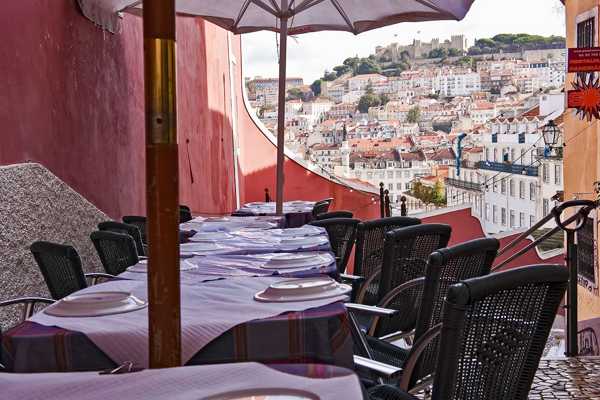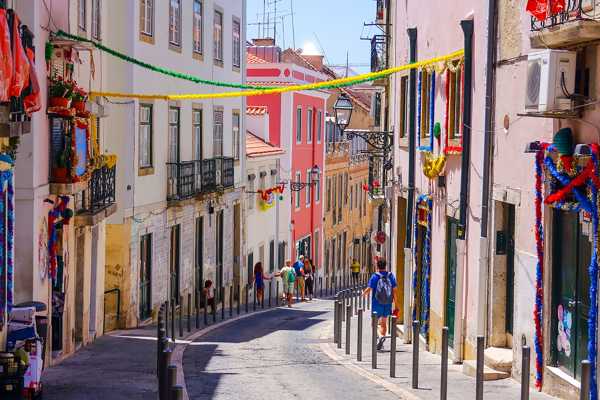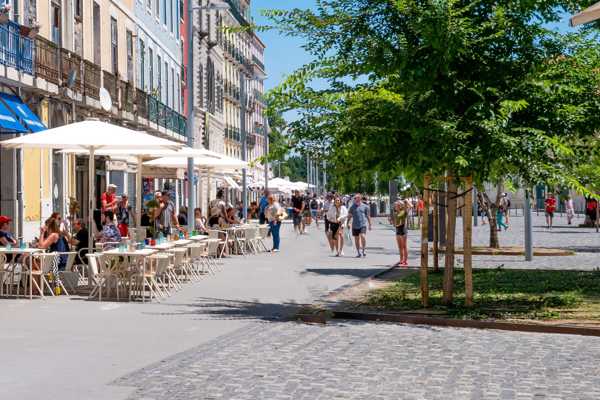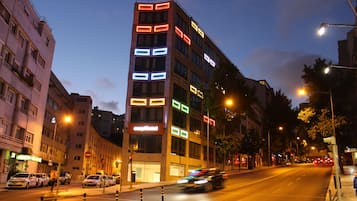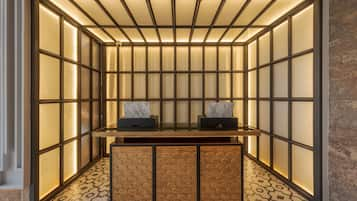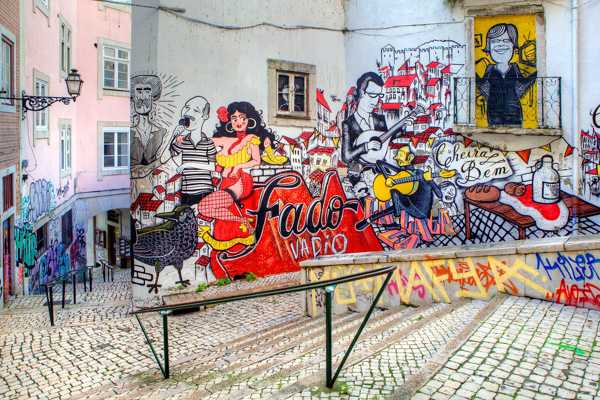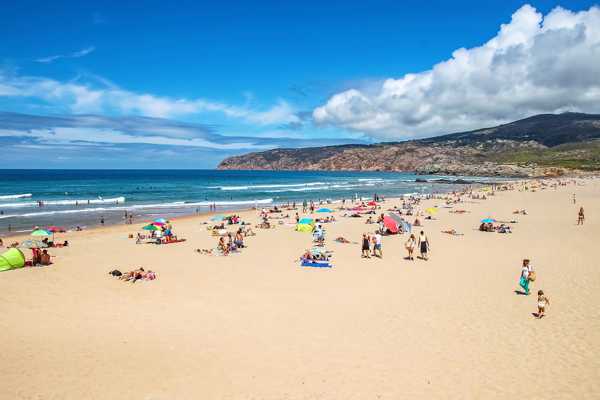Some of the most iconic buildings and places in Lisbon are conveniently found in the city’s medieval neighbourhoods like Baxia and Alfama. Portugal’s coastal capital has a colourful history that’s still evident in its many squares, buildings, and monuments.
Lisbon has a strong historical and cultural vibe, so you’ll likely feel as if you’ve travelled back to ancient times. The city’s winding cobbled streets are lined with atmospheric cathedrals, fortified towers, and sweeping stone arches. You can easily explore these places on foot, but there’s also a charming old-fashioned tram that serves Lisbon’s popular tourist districts. Make sure to include these famous landmarks of Lisbon in your travel itinerary.
- 1
Praça do Comércio
Emblematic plaza in central Lisbon

- Budget
- History
- Photo
The Praça do Comércio is one of the most iconic places in Lisbon. Three sides of this picturesque plaza are flanked by white-and-yellow Pombaline structures while its southern side overlooks the Tagus. The square is a prominent tourist hub in the city, offering plenty of excellent shops, bars, and restaurants.
Exploring the plaza on foot is a great way to take in its historic vibe. Must-sees include an equestrian sculpture of King Jose I and the 30-metre-high Arco da Rua Augusta. You can climb to the top of the arch for expansive views of Praça do Comércio, the Tagus, and parts of central Lisbon.
Location: Praça do Comércio, 1100-148 Lisboa, Portugal
Map - 2
Lisbon Cathedral
Gorgeous 12th-century Roman Catholic church

- Couples
- History
- Photo
The Lisbon Cathedral dates back to the 12th century, making it one of Portugal’s oldest Roman Catholic churches. This iconic building has various architectural styles as it underwent extensive renovations after the 1755 Lisbon earthquake.
You can find elements of Romanesque, gothic, baroque, and neoclassical architecture at the Lisbon Cathedral. The church is shaped like a Latin cross, featuring the main chapel and 3 aisles. Besides housing the tombs of King Afonso IV and his family, it serves as a notable place of worship in Lisbon.
Location: Largo da Sé, 1100-585 Lisboa, Portugal
Open: Monday–Saturday from 10 am to 6 pm (closed on Sundays)
Phone: +351 21 886 6752
Map - 3
São Jorge Castle
Hilltop Moorish castle in Lisbon

- History
- Photo
The São Jorge Castle (Castelo de S. Jorge) is a fortified royal residence in Lisbon’s Santa Maria Maio district. The complex was established during the Moorish period and consists of the castle, 10 towers, archaeological ruins, a vast garden, and a terraced square.
A series of steps take you to the top of the Tower of Ulysses, where a camera obscura was installed in 1998. There’s also a permanent exhibition displaying objects dating back to the 11th and 12th centuries. You can enjoy panoramic views of the castle at the nearby Miradouro do Castelo de São Jorge.
Location: R. de Santa Cruz do Castelo, 1100-129 Lisboa, Portugal
Open: Daily from 9 am to 9 pm
Phone: +351 21 880 0620
Map - 4
Convento do Carmo
Historic Portuguese-Gothic ruin in Chiado

- History
- Photo
The Convento do Carmo is a historic ruin in Lisbon’s Chiado district, roughly 1 km west of the São Jorge Castle. What was originally the largest church in Lisbon is now a reminder of the city’s devastating 1755 earthquake.
You can explore the 14th-century complex, which consists of a roofless nave, Portuguese-Gothic facades, and partially destroyed windows. The main altar houses the Museu Arqueológico do Carmo. It displays a wide range of quirky items, such as shrunken heads, a pair of South American mummies, and King Ferdinand I’s tomb.
Location: Largo do Carmo, 1200-092 Lisboa, Portugal
Open: May–September: Monday–Saturday from 10 am to 7 pm. October–April: Monday–Saturday from 10 am to 6 pm
Phone: +351 21 346 0473
Map - 5
Belém Tower
16th-century structure overlooking Lisbon and the Tagus

- History
- Photo
The Belém Tower is a UNESCO-listed structure in Lisbon. It was built on the northern bank of the Tagus during the 16th century, serving as both the city’s defence tower and a symbol of King Manuel I’s reign (1495-1521).
The Belém Tower contains a bastion and 4-storey tower, from which you can enjoy expansive views of Lisbon. The tower also has stonework motifs of the Cross of Portugal, St Vincent (Lisbon’s patron saint), armillary spheres, and the royal coat of arms. It’s a good idea to get there early as the fort can only accommodate 150 people at a time.
Location: Av. Brasília, 1400-038 Lisboa, Portugal
Open: Monday–Saturday from 10 am to 5.30 pm (closed on Sundays)
Phone: +351 21 362 0034
Map - 6
Águas Livres Aqueduct
18th-century stone aqueduct west of Lisbon

- Budget
- History
- Photo
The Águas Livres Aqueduct is one of the most impressive stone structures in Portugal. Spanning a total length of nearly 58 km, it was built in the 18th century to supply drinking water to Lisbon. The aqueduct’s main section has 109 arches across an 18-km expanse between Caneças and Sintra.
Mãe d’Água das Amoreiras is a must-visit at the Águas Livres Aqueduct. The 18th-century reservoir has a terrace overlooking the city of Lisbon. It also hosts guided tours, touring exhibitions, and cultural events throughout the year. Visit the Marcelino Mesquita Garden for a great view of the aqueduct.
Location: CC da Quintinha 6, 1070-225 Lisboa, Portugal
Phone: +351 21 810 0215
Map - 7
Alfama
Lisbon’s oldest neighbourhood

- Budget
- History
- Photo
Alfama is one of the most picturesque neighbourhoods in Lisbon. It’s where you can visit iconic landmarks like Lisbon Cathedral, São Jorge Castle, Museu do Fado, and Museu de Lisboa. The area also has a solid choice of quirky shops, cafés, and viewpoints, as well as an artisanal atmosphere.
Alfama is served by Lisbon’s convenient Tram 28 route. A great way to discover the neighbourhood’s real charm is simply getting lost amid its historically rich alleys. After a day of sightseeing, you can enjoy dinner and drinks at the neighbourhood’s many fado bars and local restaurants.
Map - 8
Church of Sao Roque
One of the oldest Jesuit churches in the world

- Budget
- Couples
- Photo
The Church of Sao Roque dates back to the 16th century, making it one of the world’s oldest Jesuit churches. A notable landmark in Lisbon, you’re sure to be wowed by the no-expense-spared level of exquisite decoration to the interior. It has a chancel and 8 side-chapels built in baroque style, with intricate gildings, carvings, and upholsteries.
A standout feature is the Chapel of St John the Baptist, which is one of the most expensive chapels in Europe. Its side panels feature mosaic depictions of biblical scenes like the Annunciation and Pentecost and The Baptism of Christ. Check out the adjacent Museu de São Roque (Museum of St. Roch), which displays various relics from the church.
Location: Largo Trindade Coelho, 1200-470 Lisbon, Portugal
Phone: +351 21 323 5065
Map - 9
National Pantheon
17th-century mausoleum honouring Portuguese figures

- History
- Photo
The National Pantheon is a Lisbon landmark that houses the tombs of notable Portuguese figures. It was formerly known as the Church of Santa Engrácia, a 17th-century baroque church dedicated to a martyr of the same name.
Today, it’s the final resting place of celebrated author Almeida Garrett, fado vocalist Amalia Rodrigues, and former president Manuel de Arriaga. The National Pantheon is in Alfama, one of Lisbon’s most popular neighbourhoods. It’s within walking distance of the Church of São Vicente de Fora and the Botto Machado Garden.
Location: Campo de Santa Clara, 1100-471 Lisboa, Portugal
Open: Tuesday–Sunday from 10 am to 5 pm (closed on Mondays)
Phone: +351 21 885 4820
Map - 10
Santa Justa Lift
Cast-iron elevator with a viewing platform

- History
- Photo
The Santa Justa Lift (Elevador do Carmo) is a cast-iron elevator that stands 15 metres above Lisbon’s historic centre. Designed by Raoul Mesnier du Ponsard, it's a national monument and an example of neo-Gothic architecture in Portugal.
The Santa Justa Lift is part of the city’s public transport system, linking Baixa (Downtown Lisbon) with Largo do Carmo (Carmo Square). You can walk up a spiral staircase to the elevator’s top floor, which has a viewing platform overlooking central Lisbon. Get there early as queues are quite long, especially during peak season.
Location: R. do Ouro, 1150-060 Lisboa, Portugal
Open: Daily from 7 am to 10.45 pm
Phone: +351 21 413 8679
Map

